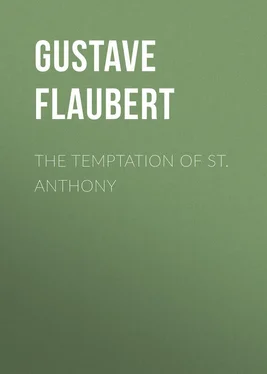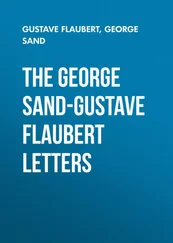Gustave Flaubert - The Temptation of St. Anthony
Здесь есть возможность читать онлайн «Gustave Flaubert - The Temptation of St. Anthony» — ознакомительный отрывок электронной книги совершенно бесплатно, а после прочтения отрывка купить полную версию. В некоторых случаях можно слушать аудио, скачать через торрент в формате fb2 и присутствует краткое содержание. Жанр: foreign_antique, foreign_prose, на английском языке. Описание произведения, (предисловие) а так же отзывы посетителей доступны на портале библиотеки ЛибКат.
- Название:The Temptation of St. Anthony
- Автор:
- Жанр:
- Год:неизвестен
- ISBN:нет данных
- Рейтинг книги:3 / 5. Голосов: 1
-
Избранное:Добавить в избранное
- Отзывы:
-
Ваша оценка:
- 60
- 1
- 2
- 3
- 4
- 5
The Temptation of St. Anthony: краткое содержание, описание и аннотация
Предлагаем к чтению аннотацию, описание, краткое содержание или предисловие (зависит от того, что написал сам автор книги «The Temptation of St. Anthony»). Если вы не нашли необходимую информацию о книге — напишите в комментариях, мы постараемся отыскать её.
The Temptation of St. Anthony — читать онлайн ознакомительный отрывок
Ниже представлен текст книги, разбитый по страницам. Система сохранения места последней прочитанной страницы, позволяет с удобством читать онлайн бесплатно книгу «The Temptation of St. Anthony», без необходимости каждый раз заново искать на чём Вы остановились. Поставьте закладку, и сможете в любой момент перейти на страницу, на которой закончили чтение.
Интервал:
Закладка:
Flaubert was but twenty-six when the first suggestion of his masterpiece came to him. For La Tentation de St. Antoine , it is coming to be understood, is his masterpiece; is one of the greatest literary achievements of the French mind. Madame Bovary is more widely famous and popular, but Flaubert himself always deeply resented this preference, and was always astonished at the comparative indifference of the world to the "Temptation." He, too, found it difficult to realize how hardly the average mind is awakened to an interest in the incorporeal; how surely cosmic generalizations escape the grasp of the commonplace intelligence.
Wagner waited a lifetime before the world was dragged reluctantly and resentfully up to a point from which it could discern the superiority of the tremendous finale of the Götterdämmerung to the Christmas-card chorus of angels chanting " Âme chaste et pure " to the beatified Marguerite. The whole prodigious structure of Wagner's dramatic and musical thought might have remained a mere adumbration in the soul of one German had chance not set a mad genius upon the throne of Bavaria. The bourgeoisie would – lacking this royal bullying – have continued to prefer Goethe and Gounod. Flaubert's great work unfortunately failed of such patronage.
It was in 1845 that an old picture by Breughel, seen at Genoa, first inspired Flaubert to attempt the story of St. Anthony. He sought out an engraving of this conception of Peter the Younger (surnamed "Hell-Breughel" for his fondness for such subjects), hung it on his walls at Croisset, and after three years of brooding upon it began, May 24, 1848, La Tentation de St. Antoine. In twelve months he had finished the first draught of the work, which bulked to 540 pages. It was laid aside for "Bovary," and a second version of the "Temptation" was completed in 1856, but this time the manuscript had been reduced to 193 pages, and the "blazing phrases, the jewelled words, the turbulence, the comedy, the mysticism" of the first version had been superseded by a larger, more dramatic conception. In 1872 he made still a new draught, and by this time it had shrunk to 136 pages. He even then eliminated three chapters, and finally gave to the world in 1874 "this wonderful coloured panorama of philosophy, this Gulliver-like travelling amid the master ideas of the antique and early Christian worlds."
Faguet says, "In its primitive and legendary state the temptation of St. Anthony was nothing more than the story of a recluse tempted by the Devil through the flesh, by all the artifices at the Devil's disposal. In the definite thought of Flaubert the temptation of St. Anthony has become man's soul tempted by all the illusions of human thought and imagination. St. Anthony to the eyes of the first naive hagiologists is a second Adam, seduced by woman, who was inspired by Satan. St. Anthony conceived by Flaubert is a more thoughtful Faust; a Faust incapable of irony, not a Faust who could play with illusions and with himself – secretly persuaded that he could withdraw when he chose to give himself the trouble to do so – rather a Faust who approached, accosted, caressed all possible forms of universal illusions."
Flaubert's studies for the "Temptation" were tremendous. For nearly thirty years he touched and retouched, altered, enlarged, condensed. He kneaded into its substance the knowledge, incessantly sought, of all religions and philosophies; of all the forms man's speculations had taken in his endless endeavours to explain to himself Life and Fate; humanity's untiring, passionate effort to find the meaning of its mysterious origin and purpose, and final destiny. How terrible, how naive, how fantastic, bloody, grovelling, and outrageous were most of the solutions accepted, the gigantic panorama of the book startlingly sets forth. What gory agonies, what mystic exaltations, what dark cruelties, frenzied abandons, and inhuman self denials have marked those puzzled gropings for light and truth are revealed as by lightning flashes in the crowding scenes of the epic. For the Temptation of St. Anthony is an epic. Not a drama of man's actions, as all previous epics have been, but a drama of the soul. All its movement is in the adventure and conflict of the spirit. St. Anthony remains always in the one place, almost as moveless as a mirror. His vision – clarified of the sensual and the actual by his fastings and macerations – becomes like the surface of an unruffled lake. A lake reflecting the aberrant forms of thoughts that, like clouds, drift between man and the infinite depths of knowledge. Clouds of illusion forever changing, melting, fusing; assuming forms grotesque, monstrous, intolerable; until at last the writhing mists of speculation and ignorance are drunk up by the widening light of wisdom and the fogs and phantasms vanish, leaving his consciousness aware, in poignant ecstasy, of the cloudless deeps of truth. The temptation of the flesh is but a passing episode. An eidolon of Sheba's queen offers him luxury, wealth, voluptuous beauty, power, dainty delights of eye and palate in vain. Man has never found his most dangerous seductions in the appetites. More lamentable disintegration has grown from his attempts to pierce beyond the body's veil. The parched and tortured saint is whirled by vertiginous visions through cycles of man's straining efforts to know why, whence, whither. He assists at the rites of Mithira, the prostrations of serpent-and-devil-worshippers, worshippers of fire, of light, of the Greeks' deified forces of nature; of the northern enthronement of brute force and war. He is swept by the soothing breath of Quietism, plunges into every heresy and philosophy, sees the orgies, the flagellations, the self mutilations, the battles and furies of sects, each convinced that it has found the answer at last to the Great Question, and endeavouring to constrain the rest of humanity to accept the answer. He meets the Sphinx – embodied interrogation – and the Chimera – the simulacrum of the fantasies of the imagination – dashing madly about the stolid querist.
Lucifer – spirit of doubt of all dogmatic solutions – mounts with Anthony into illimitable space. They rise beyond these struggles and furies into the cold uttermost of the universe; among innumerable worlds; worlds yet vaguely forming in the womb of time, newly come to birth, lustily grown to maturity; worlds dying, decaying, crumbling again into atomic dust. Overcome by the intolerable Vast, Anthony sinks once more to his cell, and Lucifer, who has shown him the macrocosm, opens to him the equal immensity of the microcosm. Makes him see the swarming life that permeates the seas, the earth and atmosphere, the incredible numerousness of the invisible lives that people every drop of water, every grain of sand, every breath of air. The unity of life dawns upon him, and his heart, withered by dubiety, melts into joyousness and peace. As the day dawns in gold he beholds the face of Christ.
Flaubert's Lucifer has no relation to the jejune Devil of man's early conception of material evil, nor does he resemble Goethe's Mephistopheles; embodiment of the Eighteenth Century's spirit of sneering disbeliefs and negation. He is rather our own tempter – Science. He is the spirit of Knowledge: Nature itself calling us to look into the immensities and read just our dogmas by this new and terrible widening of our mental and moral horizons. This last experience of the Saint reproduces the spiritual experiences of the modern man; cast loose from his ancient moorings, and yet finding at last in his new knowledge a truer conception of the brotherhood of all life in all its forms, and seeing still, in the growing light, the benignant eyes of God.
It is not remarkable that Flaubert resented the banality, the dull grossness of the reception of his work, or that Hearn shared his amazement and bitterness. Even yet the world wakes but slowly to the true character of this masterpiece; this epic wrought with so great a care and patience, so instinct with genius, dealing perhaps more profoundly than any other mind has ever done with the Great Adventure of humanity's eternal search for Truth.
Читать дальшеИнтервал:
Закладка:
Похожие книги на «The Temptation of St. Anthony»
Представляем Вашему вниманию похожие книги на «The Temptation of St. Anthony» списком для выбора. Мы отобрали схожую по названию и смыслу литературу в надежде предоставить читателям больше вариантов отыскать новые, интересные, ещё непрочитанные произведения.
Обсуждение, отзывы о книге «The Temptation of St. Anthony» и просто собственные мнения читателей. Оставьте ваши комментарии, напишите, что Вы думаете о произведении, его смысле или главных героях. Укажите что конкретно понравилось, а что нет, и почему Вы так считаете.












